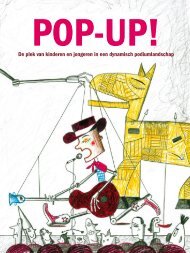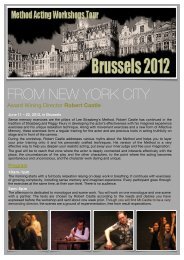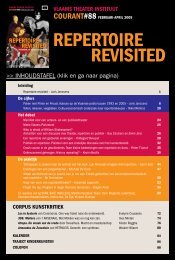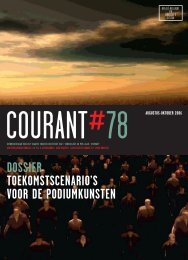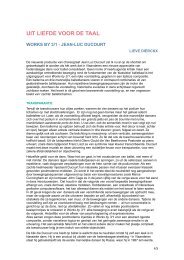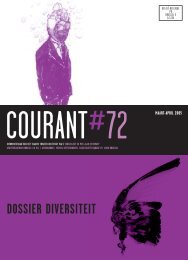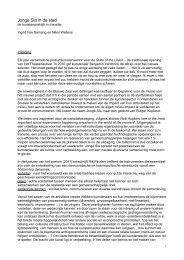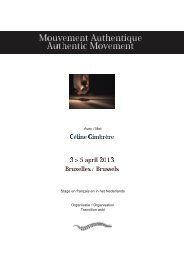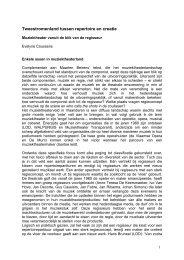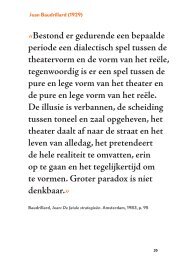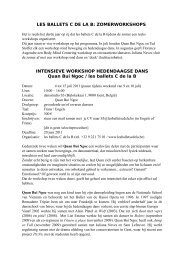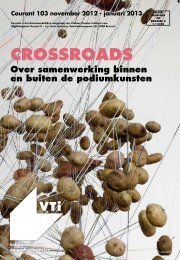music theatre in flanders - Muziekcentrum Vlaanderen
music theatre in flanders - Muziekcentrum Vlaanderen
music theatre in flanders - Muziekcentrum Vlaanderen
Create successful ePaper yourself
Turn your PDF publications into a flip-book with our unique Google optimized e-Paper software.
houses’ often <strong>in</strong>flexible trade union regulated operat<strong>in</strong>g procedures<br />
– a movement that followed developments <strong>in</strong> <strong>theatre</strong> and<br />
dance, which (as far as the author knows) received more acclaim,<br />
support and promotion <strong>in</strong> the Benelux than <strong>in</strong> the German cultural<br />
scene. Highly creative production teams of directors, composers,<br />
writers and dramatists developed new forms of – sometimes<br />
cross-discipl<strong>in</strong>ary – <strong>music</strong> <strong>theatre</strong>, that abandon the traditional<br />
stage and, for <strong>in</strong>stance, theatrically explore public spaces for<br />
specific projects. The public response varies clearly depend<strong>in</strong>g<br />
on concept, topicality, renown, occasion and location. Here, too,<br />
we f<strong>in</strong>d a mostly small group of aficionados that rarely mix with<br />
‘classic opera fans’, but rather with contemporary <strong>theatre</strong> and<br />
dance devotees.<br />
Contrary to the German speak<strong>in</strong>g territory, Belgium has to<br />
offer a highly diversified <strong>music</strong> <strong>theatre</strong> scene outside the opera<br />
houses. They also receive more recognition from culture policy<br />
makers, result<strong>in</strong>g <strong>in</strong> higher government support. The Belgian<br />
<strong>music</strong> <strong>theatre</strong> scene has broken out of the niche and addresses a<br />
broad and diversified audience, that feels connected with its <strong>theatre</strong><br />
companies and artists, and identifies with them.<br />
The big budget contemporary works, however, allow themselves<br />
to be produced exclusively <strong>in</strong> established houses or by rich<br />
festivals for practical-f<strong>in</strong>ancial reasons.<br />
OperA And ITS TAbOO: where IS The AudIenCe OF TOMOrrOw/OF<br />
The FuTure?<br />
For all that, the present status quo is unsatisfactory: today, opera<br />
and <strong>music</strong> <strong>theatre</strong> (I mean contemporary opera and its experimental<br />
exponents) are still the exclusive prerogative of a m<strong>in</strong>or<br />
part of the so-called cultured middle- and upper class.<br />
Even today, opera is, to many, taboo or undiscovered territory,<br />
an art form ridden by ignorance, prejudice and <strong>in</strong>hibition, keep<strong>in</strong>g<br />
people from enter<strong>in</strong>g an opera house or <strong>in</strong>dependent venue. I do<br />
not believe that opera – contemporary opera <strong>in</strong>cluded – <strong>music</strong>ally<br />
‘aims too high’ for general audiences. As an art form, opera is,<br />
<strong>in</strong> se, elitist, but the subject matter appeals to everyone: people<br />
s<strong>in</strong>g to people, whatever the colour, race or social class to which<br />
they belong.<br />
In ‘real life’, however, marg<strong>in</strong>al groups and migrants are hardly<br />
given the chance to f<strong>in</strong>d the way to the opera or <strong>music</strong> <strong>theatre</strong>,<br />
except perhaps accidentally for educational projects. General<br />
<strong>music</strong> education <strong>in</strong> the German territory is below standard. So far,<br />
education planners still seem unaware of the ‘socio-educational<br />
value’ of <strong>music</strong> and <strong>theatre</strong> education. If they were, <strong>music</strong> education<br />
f<strong>in</strong>ally would have been given the prestige of a major subject,<br />
<strong>in</strong>stead of be<strong>in</strong>g omitted from the curriculum. Until today, the relevance<br />
and significance of <strong>music</strong> education has been completely<br />
underestimated.<br />
Quite some successful <strong>music</strong> projects with disfavoured social<br />
groups – such as the Rhythm is it dance project with Simon Rattle,<br />
Roystom Maldoon and the Berl<strong>in</strong> Philharmonic, or Daniel Barenboim’s<br />
West-Eastern Divan-youth orchestra – have shown the value<br />
of a creative approach to <strong>music</strong> and <strong>theatre</strong> education. This is also a<br />
form of audience recruitment: when they discover their passion for<br />
<strong>music</strong>, <strong>theatre</strong> or art, <strong>in</strong>stead of violence, aggression or depression,<br />
all these youngsters become part of our ‘cultural pool’ and educational<br />
work would generate new audiences.<br />
AudIenCe reCruITMenT beTween ‘publIC relATIOnS’ And<br />
‘ArT eduCATIOn’<br />
What is the trick? How can we ‘popularize’ <strong>music</strong> <strong>theatre</strong>? How<br />
can we present it to the general public, without any populism and<br />
66 67<br />
table of contents



